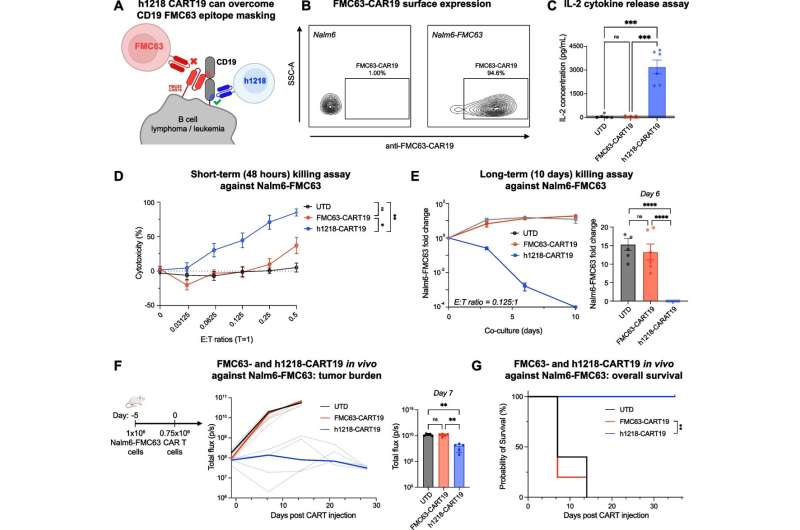This article has been reviewed according to Science X's editorial process and policies. Editors have highlighted the following attributes while ensuring the content's credibility:
fact-checked
peer-reviewed publication
trusted source
proofread
First-in-human clinical trial of CAR T cell therapy with new binding mechanism shows promising early responses

Early results from a Phase I clinical trial of AT101, a new CAR T cell therapy that uses a distinct binding mechanism to target CD19, show a 100% complete response (CR) rate at the higher dose levels studied in the trial, according to researchers from the University of Pennsylvania Perelman School of Medicine and Penn Medicine's Abramson Cancer Center.
The findings were published in Molecular Cancer and presented at the 65th American Society of Hematology (ASH) Annual Meeting and Exposition (Abstract 2096).
CAR T cell therapy has revolutionized treatment for many people with blood cancers who had run out of other treatment options. While some patients experience long-term responses to CAR T cell therapy, it doesn't work–or the cancer eventually returns–for others. The CD19 CAR T cell therapies that are currently approved all target CD19 through the same epitope (FMC63).
To try and make CD19 CAR T cell therapy more effective for more patients, Marco Ruella, MD, an assistant professor of Hematology-Oncology and Scientific Director of the Lymphoma Program, and his research team, along with the Korean company AbClon Inc, co-developed a CAR T product (AT101), using cells originating from the same patient, that targets CD19 through a different epitope, located closer to the cell membrane, via a novel antibody (h1218).
In preclinical studies, the team previously demonstrated that h1218-CART19 had decreased T cell exhaustion and improved control compared to FMC63-CART19.
The Phase I first-in-human clinical trial (NCT05338931) was conducted in South Korea and enrolled 12 patients with relapsed or refractory B cell non-Hodgkin's lymphoma (NHL). The study was designed to increase the dose level of AT101 after safety was confirmed in the first six patients. After a median follow-up of 6.5 months, all six patients who received dose level 2 or higher experienced a complete response and their cancer has not relapsed.
"We've learned that the way you design your CAR really matters. Designing a different CAR might drastically change the way the T cells work, potentially allowing that CAR T cell product to work where other CAR T cell products have failed," Ruella said.
"We were not expecting such a drastic early difference in this study. The CART19 products that are already FDA-approved are very effective, and it's not easy to do better. While there is not a randomized trial of this product yet, the initial results seem very promising, and we look forward to moving into the planned Phase II portion of the study."
The drug was found to be safe, with manageable side effects, including cytokine-release syndrome in four patients and immune-cell-related neurotoxicity syndrome in three patients. One patient experienced grade 3 sepsis that resolved; the same patient later developed fatal neutropenic septic shock outside the dose-limiting toxicity time frame.
The Phase I study enrolled patients who had not previously received any other CAR19 therapy. In the Phase II expansion, the study will also include patients who have previously received CAR19 therapy.
More information: Yunlin Zhang et al, Safety and efficacy of a novel anti-CD19 chimeric antigen receptor T cell product targeting a membrane-proximal domain of CD19 with fast on- and off-rates against non-Hodgkin lymphoma: a first-in-human study, Molecular Cancer (2023). DOI: 10.1186/s12943-023-01886-9


















